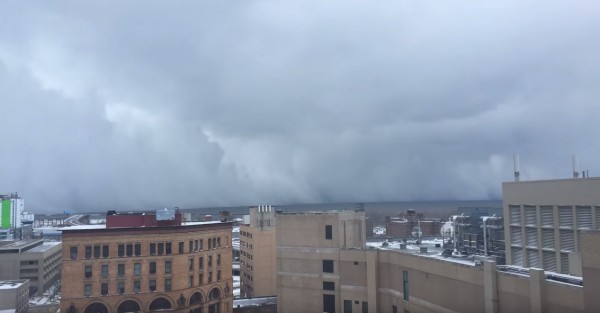More often than not, we see media companies throwing DMCA claims all over the web, quite a few of which turn out to be bogus. However, what happens when a network uses someone else's content without their permission? Well apparently CNN and CBC Canada are about to find out as a lawsuit has been filed against the two networks.
The person behind the lawsuit is Alfonzo Cutaia, who used YouTube last year in order to upload a 31 second video of the winter storm hitting. Since there was a lot of interest surrounding the video, he eventually monetized it under the ‘standard YouTube license' and sat back letting it generate ad revenue.

Screenshot of the video, which you can find, here.
The day after uploading, news outlets were getting in touch asking for permission to use the footage in a broadcast. However, it turns out that CBC went ahead and aired the video without permission, using the channel's own logo as an overlay. So how did this end up happening?
Well according to CBC, the channel obtained the footage from CNN on a ten day license. However, Cutaia did not give permission to CNN to use the footage in the first place and claims that the networks used the footage for many months, even after the supposed license should have expired.
Cutaia's lawsuit is seeking injunctions against CBC and CNN to stop using the video. The two networks are said to have intentionally violated copyright law and apparently also violated a DMCA notice. TorrentFreak managed to get a look at the lawsuit, which reads: “In order to infringe the Storm Video, CBC [and CNN] circumvented Cutaia’s technological measures limiting access to the Storm Video, without authorization, in violation of 17 U.S.C. § 1201(a)(1)(a)”.
“By its reproduction and alteration to the Storm Video, CBC [and CNN] intentionally removed and/or altered the copyright management information of the Storm Video, without authorization, in violation of U.S.C. § 1202(b)(1)”.
Cutala's lawsuit doesn't mention any specific monetary numbers for damages, but it does insist that a trial be held so a jury can decide on that. At present, the Buffalo Lake Effect video has over 3.6 million views over on YouTube.
Discuss on our Facebook page, HERE.
KitGuru Says: Well this is quite the turn of events. It isn't often we see YouTubers suing those using their footage elsewhere. Do any of you think this case stands a chance in court?
 KitGuru KitGuru.net – Tech News | Hardware News | Hardware Reviews | IOS | Mobile | Gaming | Graphics Cards
KitGuru KitGuru.net – Tech News | Hardware News | Hardware Reviews | IOS | Mobile | Gaming | Graphics Cards



In the video description he says he works as an “intellectual property attorney at Hodgson Russ” so there you go.
so in other words “they screwed with the wrong man…” lol
Kind of ironic because the CBC is claiming copyright on all their own news clips to keep the Canadian Conservative Party from using them in attack ads for the current election…
What technical circumvention? Usually ad supported clips don’t work with youtube downloader, but this worked fine. I guess he doesn’t know how youtubes encyption works…
If anything, I suspect that being aired on national news will have increased the original uploader’s revenue through what amounts to free advertising. I’d still like to see these corporations be punished for their hypocrisy though.
I also found no copyright declaration on the video. Spuriuos claims dismissal incoming.
lol what? You can download any video from youtube easy, ads or no.
Nah there’s always some that won’t.
Show me one. I need proof.
Noticed that when watching the video. Clearly it stands a good chance in court – it’s his day job to look at cases like this.
BS. If the video is on your PC, there’s plenty of ways to record it.
There’s a difference between downloading and recording, and that’s my argument. The stream is directly downloadable, 1:1. Since nothing had to be recorded the “technological measures” he’s talking about are bogus. Plus there is no copyright info on the video to edit out.
Yes, they used his video without permission. But the specific claims he’s making are bogus.
Futhermore the video is licensed under the “Standard YouTube License”, however there is no such document and therefore the video is unlicensed. The news agencys actions can be said to violate Youtube terms of service, but that’s a violation against youtube not against the copyright holder.
And there IS NOT ads on the stream when viewed correctly, so he’s not losing any revenue. In which case he can not expect any compensation.
So besides the lack of consent ALL of his claims are bogus.